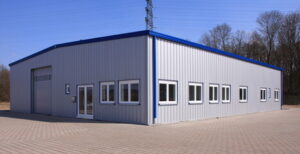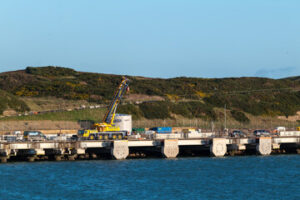Commercial construction is a complex endeavor requiring a contractor well-versed in the industry. Examine their work history and credentials to ensure that they can navigate any complexities that may come up.

Commercial Contractors OKC understand the building codes and permit regulations, ensuring your project complies with all laws and requirements. They also have the skills to handle significant challenges like site preparation, material management, vendor and sub-contractor management.
There are a lot of factors to consider when choosing a commercial contractor for your business project. Some of these include work ethic, experience, and the ability to keep up with your timeline for completion. A good commercial contractor should be able to answer any questions you might have and will take the time to explain things to you in a way you can understand.
Experienced commercial contractors have a wide knowledge of the requirements and tasks that are related to the designing, construction, and completion of commercial building projects of all types and sizes. They are familiar with the special project execution techniques that are required for commercial construction and can easily comply with the building codes and other statutory regulations that are associated with it.
They are also familiar with the different working environments that exist in a commercial construction site compared to a residential one. For instance, they are accustomed to the special requirements that exist for fire safety protocols, exit points, and material regulations. In addition, they are accustomed to the specialized requirements that exist in working on large-scale commercial projects like hospitals and other large structures.
Besides their expertise in the field of commercial construction, they are also experienced with the procurement of materials and other resources that are needed for commercial projects. They will order the necessary materials from reliable vendors and ensure that they are delivered to the construction site on time. Additionally, they will monitor the quality of the materials and other resources to ensure that they are in line with project specifications.
Finally, they are also able to handle the hiring process for other contractors and subcontractors. This includes hiring professionals that can perform specialized tasks that other contractors may not have the credentials to handle.
Choosing the right commercial contractor is essential for the success of your business project. Whether it is a small project like adding an extra office or a major construction of a hospital, you need a professional that can complete the job to your satisfaction. To ensure that you choose the best commercial contractor for your project, make sure they have a valid license to work in your area and that they are insured.
Reputation
When selecting a commercial contractor, it is important to find out about their reputation. This includes reviews from previous clients as well as client satisfaction ratings. This will give you an idea of how the contractor works and what their quality standards are. The better the contractor’s reputation, the more likely they will do a good job for you and gain your trust in the future.
Check out their website to see their work history and portfolio. Look for projects that are similar to your own and see how they handled the challenges that arose. It is also helpful to speak with a few of their past clients and ask about how easy it was to work with them, whether they stayed within budget and schedule and if they were able to overcome any roadblocks that came up during the project.
Licensed contractors are required to follow state and local regulations when working on construction sites. It is also important to understand what their licenses cover and if they have additional accreditations. This will help you avoid any potential issues and ensure your project is completed on time.
Another factor to consider is the safety record of the commercial contractor. A reputable company will always put safety first. Accidents on the job can cause major delays and costly fees and penalties. Choose a commercial contractor that has a low EMR and DART metric, which will indicate how safe they are on the job.
With TrustedPros, you can find a commercial contractor that will complete your project with success. You can view their work history with photos, client reviews and rating, licensing and insurance info, awards, company structure and even a TrustedPros score (the most reliable contractor ranking system in the US). By using this service, you can avoid hiring unscrupulous contractors that will waste your money and damage your business reputation.
License
Many states and cities have rules requiring contractors to carry a license. This means that they have met certain requirements, such as having a specific amount of experience and insurance. Some also have a process for checking up on those who work in the industry. It is important to check with each state’s regulations on this issue.
Some states require that all commercial construction projects be done by licensed contractors. This helps protect the public from companies that may not be reputable or do quality work. Typically, the licensing process involves an exam that includes trade knowledge and business law. The test usually consists of two sections, and the contractor must pass both to receive their license. The trade knowledge section typically covers things like plumbing, roofing and electrical work. The business law section covers best practices, tax rules and other aspects of running a business.
The term “licensed” isn’t the same as being “registered,” or even being “certified.” Each state has its own requirements for this type of work, and it can be very stringent. For example, Oregon requires all construction contractors to be licensed. Applicants must complete a 16-hour course, and their business must have the appropriate identification number. In addition, a contractor must have the required amount of insurance coverage and have a surety bond.
Licensing is also a way for states to keep track of contractors and ensure that they are up to date on the laws in their area. It also makes it easier for the government to enforce contracts in case something goes wrong on a project.
Some examples of work that requires a license include demolition, excavation and paving, and new commercial buildings. It also applies to remodeling, additions, and renovations for commercial properties. Some states also have specific classes for specialty contractors, such as plumbing, electrical or HVAC.
The District of Columbia has its own rules regarding licensing, and this includes residential work and work in the wetlands. In order to get a DC license, you must complete an application with the Department of Commerce, Community and Economic Development. You will also need to pass an International Code Council exam and show proof of insurance.
Insurance
Commercial contractors often require specific insurance coverage depending on the size and scope of a project. These policies can include general liability, business owners policy (BOP), commercial auto, workers’ compensation, property and umbrella. Some companies may also need a surety bond or fidelity insurance. Insurance rates vary based on the risk and the type of work a contractor does, but experienced agents can advise you on the coverages that are best for your business.
For small contractors, a BOP typically offers an affordable package of general liability and property coverage in one policy. It can also cover tools and equipment in transit. A larger construction company might need a more comprehensive insurance policy that includes specialized workers’ comp coverage and business interruption coverage. In many cases, a contractor’s insurer will ask about their experience and past claims history before offering them a policy. Businesses with several claims in the past will typically pay higher premiums than those with a clean record.
Some states require all contractors to carry workers’ compensation insurance. This coverage pays for medical bills and lost wages for employees who are injured or become ill on the job. It also helps protect the employer from lawsuits filed by employees. Insurance companies typically require employers to limit the use of uninsured subcontractors, as they have little control over the quality and safety standards of these individuals.
Other types of coverage for commercial contractors might include a business owner’s policy, which helps protect the business location and inventory from damage or theft. It can include leased or owned property, and it might even offer money for lost income if the building is damaged by fire or other disaster. Similarly, commercial property coverage might help replace lost or stolen property, including tools and supplies, office furniture, inventory and computers.
Other supplemental coverages that might be available for contractors might include crime and warranty insurance, which provide protection against fraud or problems with a product or service. Adding these coverages can help to lower the cost of a business owner’s policy or an individual insurance policy.

